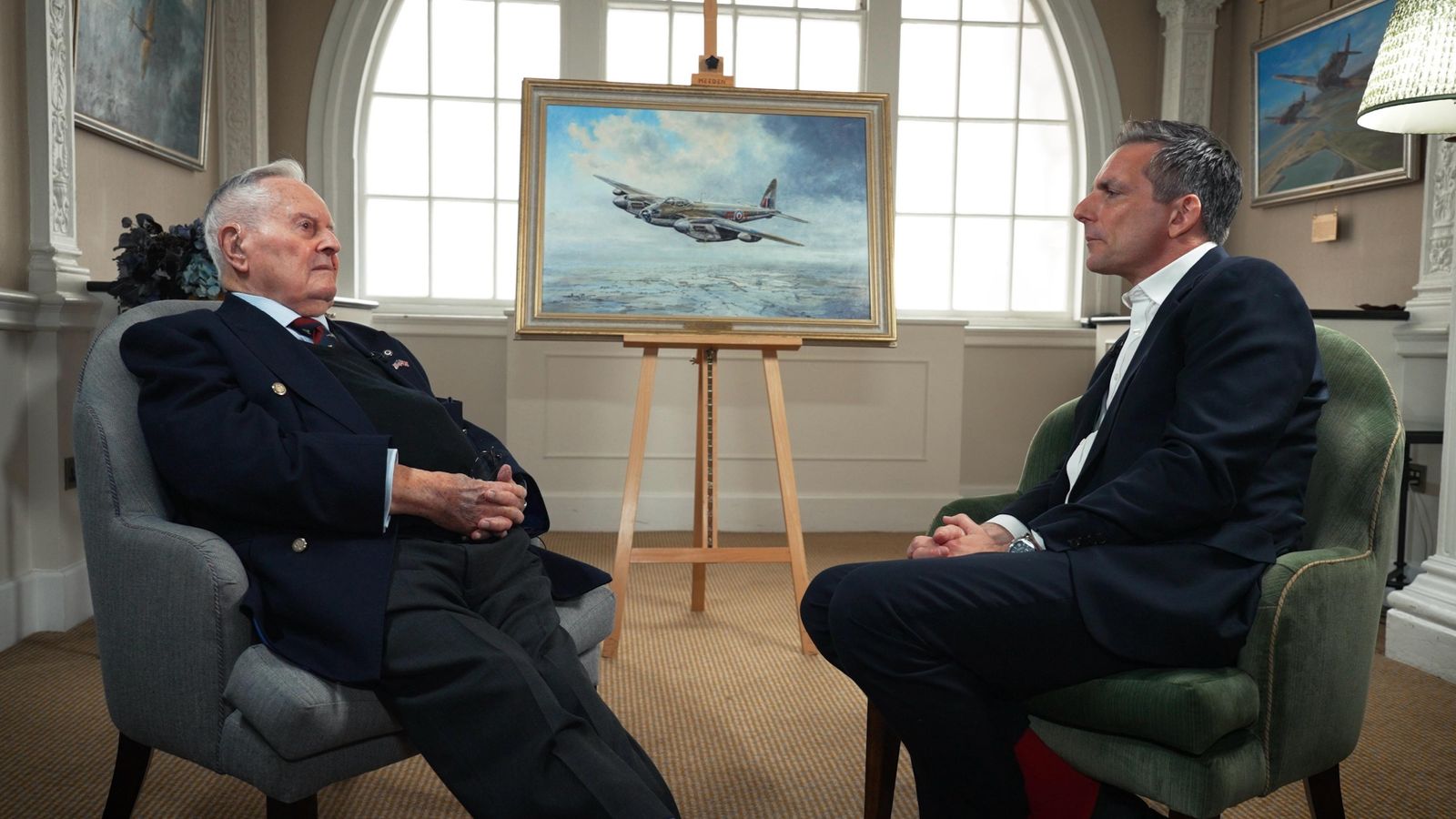Hezbollah attacks Israel with hundreds of rockets as Israeli jets hit targets in Lebanon
Hezbollah says it has attacked Israel with a large number of drones and rockets, in response to the killing of a top commander last month but Israel "pre-emptively" launched airstrikes inside Lebanon, in what it called "an act of self-defence".

Joe Biden 'closely monitoring' developments in Israel and Lebanon
A spokesperson for the National Security Council, Sean Savett, has said US President Joe Biden was "closely monitoring events in Israel and Lebanon".
"At his direction, senior US officials have been communicating continuously with their Israeli counterparts.
"We will keep supporting Israel's right to defend itself, and we will keep working for regional stability," Mr Savett added.
Retired Israeli army general compares northern Israel to WW2 Blitz
A retired brigadier general from the Israeli military has compared the situation in northern Israel to the Blitz in World War Two.
Amir Avivi, who is also the founder of the Israel Defence and Security Forum, told Sky News: "In London in World War Two, children were evacuated from London to the countryside. In Israel, it's the other way around.
"We have evacuated not only children, but whole families from the countryside, from the border with Lebanon to the cities.
"80,000 people have been evacuated and have been displaced for the last ten months.
"We cannot bring them back without pushing Hezbollah out of south Lebanon and making sure that Hezbollah doesn't pose a threat on our citizens."
Meanwhile, the UN says that around 1.9 million people out of Gaza's population of 2.1 million have been displaced, often several times over, due to Israel's military operation in the region.
Mr Avivi also called for the Israeli cabinet "to launch a full-scale attack on Hezbollah and deal with the imminent war in order to push Hezbollah out of south Lebanon and destroy their capabilities".
"This is a unique moment. The US has got many forces that are deployed now throughout the Middle East to defend Israel from any shooting, whether it is Hezbollah or Iran.
"It's always good to have diplomatic solutions, but I don't see any serious motivation in the international community to really pose a threat on Iran or Hezbollah and make them withdraw and get out of south Lebanon without this international pressure.
"Israel is left pretty alone to deal with this issues, and we need to correct the terms to bring back our citizens that are displaced."
Pre-emptive strikes 'epitomises Israel's right to defend itself', president says
Israel's president has said this morning's attack "epitomises Israel's right and duty to defend itself".
Isaac Herzog said in a statement: "The decisive action we witnessed early this morning epitomises Israel's right and duty to defend itself and its citizens against the threat of terrorism.
"This is once again an opportunity to express our gratitude and support for our daughters and sons in the Israel Defense Forces, as well as in the security, emergency, and rescue services for their relentless efforts across all battlefronts.
"Their immense sacrifices and personal costs in thwarting the malicious acts of our enemies and in defending the state of Israel and its citizens deserve our deepest thanks. I hug all of them with deep gratitude!"
Benjamin Netanyahu, Israel's prime minister, announced Israel's 'pre-emptive' strikes on Lebanon at a security cabinet meeting this morning.
The exact locations of the hundreds of strikes that took place this morning has not yet been disclosed but they have mainly hit southern Lebanon and northern Israel.
Tensions have been simmering in this area for months, but Sky's correspondents have said that this morning's attacks mark a significant escalation in the region.
Military analyst Sean Bell has been examining the details of the weapons and military strategies at play in this morning's strikes.
"Everybody's trying to dominate the information space -Hezbollah wants this to be seen as a successful strike. Israel is trying to demonstrate that they were able to protect."
Hezbollah used unguided rockets in this attack which meant Israel's Iron Dome was "quite effective", he said.
Bell also said there is two points which stand out from a military perspective in the information both Hezbollah and Israel has released so far.
"The timing of the Israeli strikes is about half an hour before the Hezbollah strikes. That implies that this is a massive intelligence-led operation.
"You can imagine ever since the end of July, Israel would have been prepared for a major wave of attacks from Hezbollah and/or a major attack from Iran.
"What appears to have happened is as soon as this has happened - or they think it's going to happen - they press the red button and off it's gone.
"The other thing is just the scale -100 jets - that is a major response. In the past we've seen two or three jets.
"These jets will have all been armed with laser or GPS-guided weapons. The GPS guide - generally you have to know the targets in advance.
"This feels [like a] much more dynamic situation, but this is a pretty major response."
Bell also says that despite an increase in US military resources in the region in recent weeks, there is "no evidence" there was any US involvement.
"We understand the USS carrier Abraham Lincoln is in the region with F-35s and F-18s on board - that's a pretty substantial American effort - and the USS Georgia, a submarine. Why is that important? Because it's got 154 Tomahawk missiles on board.
"My guess is that those forces [are there to] deal with the Iranian threat.
"If you remember the last time Iran responded, it was hundreds of missiles. That takes a really robust defensive capability. I suspect those assets are being primed but kept ready should Iran launch that major wave.
"But for now [it's] a tinderbox waiting to go off."
A Hezbollah official has told Sky News the fault for this morning's attack lies with Israel.
The official said: "We restored the rules of deterrence, they attacked Lebanon in depth and we did the same to the entity,
"The fault lies with the one who started."
Meanwhile, Kassem Kassir, a Lebanese analyst with close ties to Hezbollah, said: "This is an initial response, but the battle is not over.
"No one can determine the course of the confrontation, Nasrallah [the Hezbollah leader] will speak today, we are all waiting," he added.
The Office of the United Nations Special Coordinator for Lebanon (UNSCOL) and the United Nations Interim Force in Lebanon (UNIFIL) described the developments on the Lebanese-Israeli border as "worrying".
They also called on all parties to cease fire and refrain from further escalation.
Israel's minister for foreign affairs Israel Katz has released a statement.
In a post on X, he said: "This morning, I sent a direct message to dozens of foreign ministers worldwide, urging them to support Israel against the Iranian axis of evil and its proxies, led by Hezbollah.
"I informed them that Israel acted after definitively identifying a large-scale planned attack of missiles and drones by the Hezbollah terrorist organisation against targets in Israel, and we delivered a preemptive strike to prevent the assault and protect Israeli citizens and territory.
"Israel is confronting the axis of evil led by Iran, which has the explicit aim of destroying Israel.
"We do not seek a full-scale war—but we will do whatever it takes to protect our citizens."
-SKY NEWS






